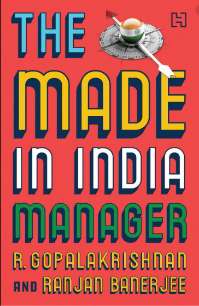The Reading Room

The Made-in-India Manager
R. Gopalakrishnan, Ranjan Banerjee
Published: 2018, Hachette India
‘Exercising influence without exercising power’ – Gopalakrishnan and Banerjee explore the phenomenon of the made-in-India manager.
With some of the world’s leading companies boasting Indian management(1) , Gopalakrishnan and Banerjee’s book explores what it is that makes Indian born and bred managers so successful on a global scale.
They navigate the topic through a series of observations, anecdotes and personal experiences, examining how nature and nurture have combined to produce highly driven, adaptable and intelligent individuals. The book is structured around the four key ingredients that they believe manifest to produce the made-in-India manager:
- An upbringing in a ‘crushingly competitive’ environment
- Experience of personal setbacks leading to accelerated learning
- A strong work ethic
- Fluency in English
Whilst the study is peppered with some impressive statistics – particularly effective when addressing India’s highly competitive education system, noting that, in 2017, Indian’s Institutes of Technology (IITs) has an acceptance rate of less than 1% compared with Harvard’s 11% – its anecdotal nature means that, at times, its arguments lack weight.
Although the reader does not doubt that the four above-mentioned characteristics are present in many successful Indian managers around the world, Gopalakrishnan and Banerjee are transparent in the fact that they are only looking at made-in-India managers in comparison to their North American peers. The authors note that these traits are not unique to India, rather it is their ‘unique combination’ that sets the made-in-India manager apart. Given the former condition, the reader is left questioning whether these are truly unique to Indian managers, or whether managers from other emerging economies may exhibit a similar winning formula.
Even so, the book is not without merit, and its conversational qualities make it very easy to turn the pages. The stories offer a candid look at familial dynamics, India’s school system and the evolving influence of technology – an interesting snapshot of life for India’s younger generations. Regardless of whether the arguments put forward represent a wide enough circle to give them credibility, they do provide a solid foundation for further study and reading.
Camilla Bryden
May 2020
(1) PepsiCo’s Laxman Narasimhan, Alphabet’s Sundar Pichai, Nokia’s Rajeev Suri, Microsoft’s Satya Nadella, Adobe’s Shantanu Narayen, Nokia’s Rajeev Suri, Deloitte’s Puneet Renjen, Mastercard’s Ajay Banga, Diageo’s Ivan Menezes, IBM’s Arvind Krishna, WeWork’s Sandeep Mathrani.
The information contained above and in other entries in the Ocean Dial Book Review Series is intended for general information and entertainment purposes only, and should not be relied upon in making, or refraining from making, any investment decisions. No information provided herein should or can be taken to constitute any form of advice or recommendation as to the merits of any investment decision. You should take independent advice from a suitably qualified investment adviser before making any investment decisions.
Africa Is Not A Country: Breaking Stereotypes of Modern Africa
Published: 2022, Vintage Publishing
Brimming with humour and intellect, Faloyin’s fascinating volume mines the rich and varied span of histories and cultures of the continent’s many countries, delivering a punchy corrective against lazy sterotypes of Africa.
Chums: How a Tiny Caste of Oxford Tories Took Over the UK
Published: Published: 2022, Profile Books
The lack of academic effort generally put in by Oxford undergraduates is an important theme running through this book, penned by Financial Times columnist Kuper. It links this work-shy attitude to the centuries’ old dominance of Oxford by the top English public schools spawning “top tory toffs with a born to rule attitude”.
What I Learned Losing a Million Dollars
Published: 2013, Columbia Business School Publishing
Jim Paul’s meteoric rise took him from a small town to governor of the Chicago Mercantile Exchange, yet he lost it all in one fatal attack of excessive economic hubris. In this honest, frank analysis, Paul and Moynihan revisit the events and examine the psychological factors behind bad financial practices in several economic sectors.


